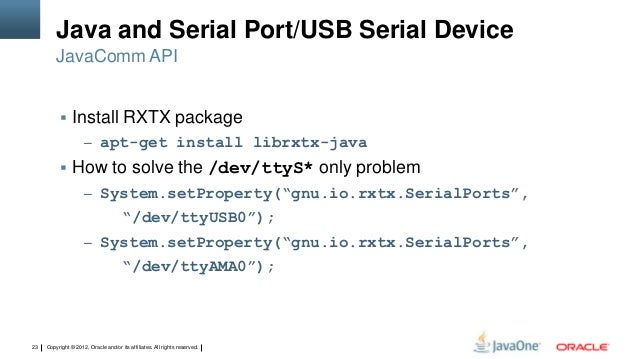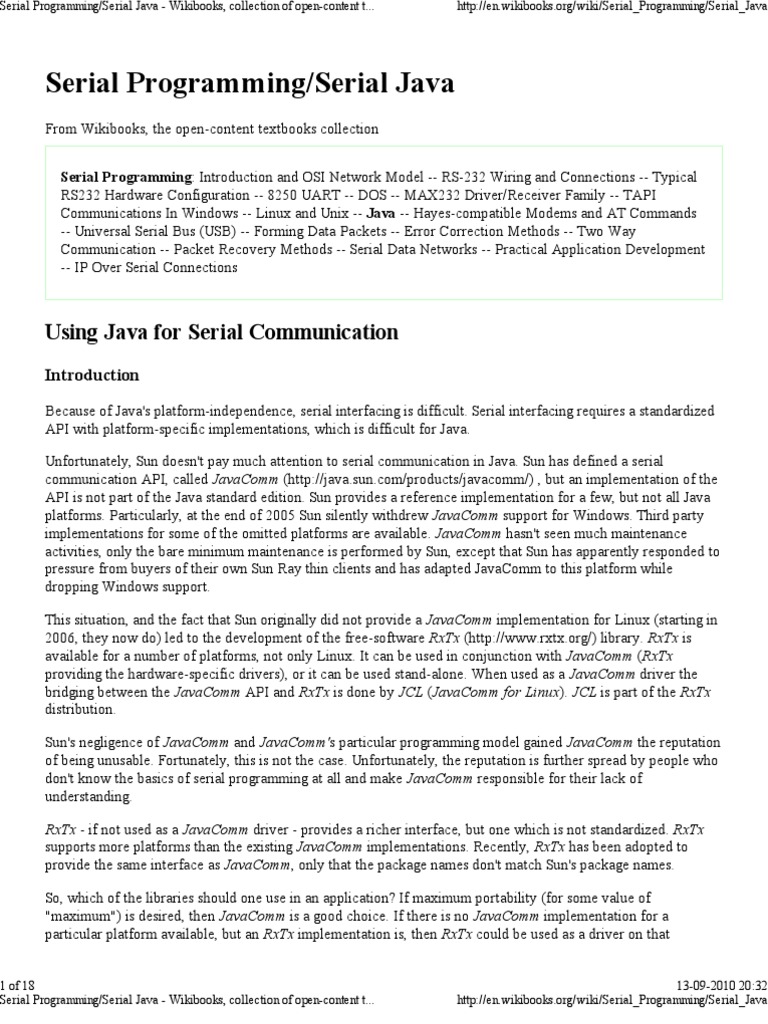Java Rxtx Usb Serial Drivers
JSSC (Java Simple Serial Connector) It consists only of one JAR file which has to be included to your project. Like RXTX jSSC has also a OS dependent part but all is included in a single JAR and you do not have to care about the system you want to use your software. JSSC provides a very simple API. If they did then why wont the serial usb port get detected on Arduino? I installed the CH340 Driver and the board now shows the USB serial as port option: of the.
Java supports communication to serial ports, but not with its default installation. It requires an installation of an external library. Currently, two options exist for achieving serial communication:.Unfortunately, the current version of JavaComm does not support Windows, and only supports Solaris SPARC, Solaris x86, and Linux x86. Since I use none of those operating systems, this article will only discuss how to install RXTX in Windows.UPDATE: 12 Sept 2011 – Thanks to a comment from Kurt Zoglmann, there are instructions on how to do this with a Mac!
I never tried this myself because I don’t have a Mac, but the procedures stated there look good to me (see ).A 32 and 64 bit version of the library exists. I’ve updated this article from when it was first published to include the new locations for where to download the libraries, but I have not gone through the installation of the libraries again, so I’m not surprised if the rest of the content on this page is outdated too.32-bit version:64-bit version:To install the libraries (instructions from ):. Copy rxtxSerial.dll to%JAVAHOME%bin, (%JAVAHOME% is the folder where JRE is installed on your system; e.g. C:Program FilesJavaj2re1.4.101). Copy RXTXcomm.jar to%JAVAHOME%libext.Once installed, the IDE will need to know where to look for these installed files. Even though the files exist in the JRE directory, each project needs to know about these files.
More information on.In order to start coding with this library, import gnu.io. For more information about Java Serial Programming, look.Happy coding! There doesn’t seem to be a prebuilt 64bit library for OS X. This is a problem with Lion since it only comes with the 64bit version of Java 1.6.026. To save someone some hassle download 2.2-pre2 from the official site. Install the free application, Xcode, from the App Store.
Then modify the configure script as follows:JAVAINCLUDEDIR=$JPATH/./././HeadersNext run the configure script./configureFinally install it by issuing the following command:sudo cp i386-apple-darwin11.0.0/librxtxSerial.jnilib /System/Library/Frameworks/JavaVM.framework/Versions/1.6/Libraries. I was wrong about there not being a 32bit version of Java in OS X Lion. If you want to use a prebuilt 32bit version of RXTX, you will be able to find the prebuilt binary with a quick google. To enable the 32 bit version of Java by default, open the “Java Preferences” application found in /Applications/Utilities. Drag the 32bit version of Java to the top and exit the program. The default java on the command line will now be the desired version and it can be found at /System/Library/Frameworks/JavaVM.framework/Versions/CurrentJDK.

. Logging of temperaturesonethird first Plug & Play USB IOdropcap31/dropcap3Turn your computer with LucidControl Plug & Play IO Modules within minutes to a powerful data acquisition, monitoring and control system./onethirdonethird Data Acquisition & Controldropcap32/dropcap3Ready for many automation applications. Measure temperatures, control your home, garden or caravan with the outstanding LucidControl IO devices./onethirdonethird RPi & Beagle Bonedropcap33/dropcap3LucidControl is compatible with the Raspberry Pi® and Beagle Bone Black which maximizes the number of possible applications.button link=”style=”info” text=”grey” window=”yes”Read more about /button/onethird.
Java Rxtx Alternative
LucidControl goes JAVAI was a bit of surprised a few weeks ago that Java has only a very limited native access to the serial comports.We use the serial ports to communicate with our. These modules have analog and digital IO functionality and they are compatible with USB CDC (Communication Device Class) which means that most operating systems provide a driver which installs a virtual comport.Microsoft Windows enumerates them as a COMxx device. Linux operating systems give the devices usually names like /dev/ttyACMxx where xx is the identifier number of the port.I’m familiar with C# which provides the SerialPort class. This is supported by dotNet and also by Mono and runs under Linux as well. I used this class several times for portable applications running mostly under Windows and Linux. Because of this I expected easy access to the serial port under Java as well and I didn’t waste much thought on doing such a common task in Java. But in reality Java does not support them – at least under Microsoft Windows.In the following I will explain which options are available in order to access serial ports in Java.
CommAPI – Limited native supportThe provides an interface to access serial ports. This sounds very good, but has one significant drawback because support for Microsoft Windows was dropped years ago and it is not possible to write portable applications anymore.Because of this severe restriction I dropped this solution without further investigation. RXTXis the first option which comes one in mind when talking about alternatives of CommAPI. It is a comprehensive and reliable interface which is used in many projects.

I used this in our pre-release revisions of JLucidIo Library. Which implements classes encapsulating the functionality of our LucidControl USB IO Modules.I thought this was a good option because it is relatively easy to install and it is working reliably. So why didn’t we go for it? This has mainly three reasons:.RXTX is not pure java.
The hardware dependent part is written in a different language.For Windows the hardware dependent layer is called rxtxSerial.dll and you can see that this part is not Java code. Maybe it was written in C, but I didn’t research this further.This makes it necessary to install different software on different computers which is not what a Java programmer prefers.I find the API of RXTX needs getting used to. It is different to the SerialPort class in C# and the implementation has one severe drawback.In C a port can be opened by using fopen(comportName) and the comport must be handy when opening the device which is the normal way to do it.RXTX uses a different approach. Before a port can be opened ALL ports must be enumerated and a list of all serial ports is created. This is done by calling CommPortIdentifier.getPortIdentifiers which isn’t the best idea in my eyes. Enumerating all serial ports by default is pointless when you only intend to open one specific port. And the implementation in RXTX is done a resource consuming way because it makes the operating system to create this list by querying all ports.
This may take a long time especially when Bluetooth is involved. The operating system may ask all (Bluetooth) devices for their ability which can take several seconds per port! Have you counted the number Bluetooth ports of your computer? I have to admit that this behavior was only reported for Microsoft Windows, but in my case it took approx. 5 seconds to open a comport.
Crack waves 9 installer. For my tool I couldn’t accept this. Last but not least the development of RXTX seems to be neglected since 2009.After all these findings I continued my search and found jSSC eventually. JSSC (Java Simple Serial Connector)The is available in version 2.6.0 which is dated on June 2013. It consists only of one JAR file which has to be included to your project.Like RXTX jSSC has also a OS dependent part but all is included in a single JAR and you do not have to care about the system you want to use your software.jSSC provides a very simple API.
In my case it took less than 30 minutes the replace RXTX by jSSC and it worked out of the box under Microsoft Windows, Ubuntu and on the Raspberry Pi.There is no more to write because it does exactly what it should – not more not less 😉 ConclusionI cannot say much about CommAPI but RXTX and jSSC are worth a look. RXTX is a good approach but because of the reasons I explained it was not the right library for our project and we went for jSSC.